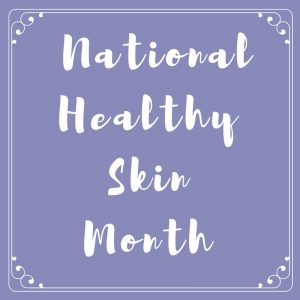6 Nutrients to Improve Skin Health
 Did you know that your skin health is a reflection of your diet? If you are lacking nutrients or have a high fat and salt diet, your skin will not look its best. On the other hand, if you are well hydrated, eat well, and take care of your skin based on dermatologist’s recommendations, your skin should look its best.
Did you know that your skin health is a reflection of your diet? If you are lacking nutrients or have a high fat and salt diet, your skin will not look its best. On the other hand, if you are well hydrated, eat well, and take care of your skin based on dermatologist’s recommendations, your skin should look its best.
November is National Healthy Skin Month, and it’s the perfect time to learn more about the importance of healthy skin, and what you can be doing about it!
Your skin happens to be the largest organ in your body and, just like you focus on heart and brain health, skin health should also be a focus. There are a number of foods that may help with your skin health, but having an overall well-balanced diet is a great starting point.
Here are 6 nutrients that can help improve your skin health:
- Vitamin C is an essential vitamin that also acts as a powerful antioxidant. This antioxidant helps to reduce damage in your body and is involved in the synthesis of collagen. Collagen is a type of protein that’s an integral part of your skin and helps keep the skin firm and healthy. Foods high in vitamin C include oranges, strawberries, kale, Brussels sprouts and bell peppers.
- Selenium is a mineral that also acts as an antioxidant and plays a role in your skins firmness and elasticity. It can also help to prevent acne. Selenium also increases absorption of vitamin E (we’ll get to this next), which is mainly stored in the skin and is what makes your skin glow. Food sources of selenium include walnuts, tuna, whole grains and brown rice.
- Vitamin E is an essential vitamin and powerful antioxidant. This vitamin plays the biggest role in your skins health. It fights off free radicals that can cause premature skin aging, such as wrinkles, as well as help prevent skin cancer. Foods high in vitamin E include almonds, eggs, avocados, spinach, and olives.
- Vitamin A is a vitamin that plays a critical role in skin repair and maintenance. Beta-carotene is the pre-cursor to vitamin A and is what acts like an antioxidant. This antioxidant helps to reduce damage caused by overexposure to the sun. Food sources high in vitamin A and beta-carotene are collard greens, peaches, sweet potato, cantaloupe and red peppers.
- Omega-3 Fatty Acids act as an anti-inflammatory and can help with inflammatory skin conditions like eczema. They are also responsible for skin repair, moisture content, and overall skin flexibility. Your body cannot make omega-3 fatty acids, they need to be taken in from your diet. Food sources include walnuts, salmon, mackerel and flax seeds.
- Water is something your body cannot live without. In fact, 60% of your body is made up of water. Since your skin is the largest organ, it needs a lot of that water! If you are dehydrated, your skin will be dry and dull. When you increase your water intake, you will notice a difference in your skin.
Dermatology Recommendations
Along with improving your diet, the American Academy of Dermatology recommends taking the following tips for good skin health:
- Wash your face every day to unclog your pores and rid your face of dirt and makeup.
- Examine your skin on a regular basis for any signs of skin cancer.
- Wear water resistant sunscreen, at least SPF 30, whenever you will be outdoors to reduce your skin’s exposure to ultraviolet rays.
- Moisturize daily to keep skin properly hydrated.
If you are ever concerned with something you see on your skin or have dry skin that doesn’t go away with hydration and moisturizing, make an appointment with your dermatologist to see if there’s anything they can do.
These tips, along with a healthy diet, can be taken each and every day to keep your skin healthy and glowing.
Your Turn to Take Action: What one change will you make today for your skin health? Let me know in the comments below.


Leave a Reply
Want to join the discussion?Feel free to contribute!